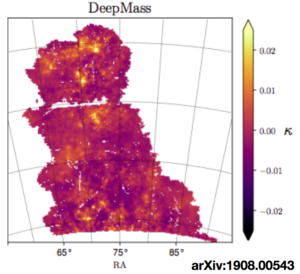| Authors: | S. Farrens |
| Language: | Python |
| Download: | GitHub |
| Description: | A Python code designed for PSF deconvolution using a low-rank approximation and sparsity. The code can handle a fixed PSF for the entire field or a stack of PSFs for each galaxy position. |
| Notes: |
This code was used to produce the results presented in the paper Space variant deconvolution of galaxy survey images. |
Introduction
The following sections provide some details for how to run sf_deconvolve.
The directory lib contains all of the primary functions and classes used for optimisation and analysis. functions contains some additional generic functions and tools.
Dependencies
In order to run the code in this repository the following packages must be installed:
- Python 2.7 [Tested with v 2.7.11]
- Numpy [Tested with v 1.11.3]
- Scipy [Tested with v 0.18.1]
- Astropy [Tested with v 1.1.2]
- Matplotlib [Tested with v 1.5.3]
- Termcolor [Tested with v 1.1.0]
The current implementation of wavelet transformations additionally requires the mr_transform.cc C++ script from the Sparse2D library in the iSap package [Tested with v 3.1]. These C++ scripts will be need to be compiled in order to run (see iSap Documentation for details).
The low-rank approximation method can be run purely in Python.
Execution
The primary code is sf_deconvolve.py which is designed to take an observed (i.e. with PSF effects and noise) stack of galaxy images and a known PSF, and attempt to reconstruct the original images. The input format are Numpy binary files (.npy) or FITS image files (.fits).
The code can be run as follows:
$ sf_deconvolve.py -i INPUT_IMAGES.npy -p PSF.npy -o OUTPUT_NAME
Where INPUT_IMAGES.npy denotes the Numpy binary file containing the stack of observed galaxy images, PSF.npy denotes the PSF corresponding to each galaxy image and OUTPUT_NAME specifies the output path and file name.
Alternatively the code arguments can be stored in a configuration file (with any name) and the code can be run by providing the file name preceded by a @.
$ sf_deconvolve.py @config.ini
Example
The following example can be run on the sample data provided in the example directory.
This example takes a sample of 100 galaxy images (with PSF effects and added noise) and the corresponding PSFs, and recovers the original images using low-rank approximation via Condat-Vu optimisation.
$ sf_deconvolve.py -i example_image_stack.npy -p example_psf.npy -o example_output --mode lowr
The example can also be run using the configuration file provided.
The result will be two Numpy binary files called example_output_primal.npy and example_output_dual.npy corresponding to the primal and dual variables in the splitting algorithm. The reconstructed images will be in the example_output_primal.npy file.
Code Options
Required Arguments
-i INPUT, --input INPUT: Input data file name. File should be a Numpy binary containing a stack of noisy galaxy images with PSF effects (i.e. a 3D array).
-p PSF, --psf PSF: PSF file name. File should be a Numpy binary containing either: (a) a single PSF (i.e. a 2D array for fixed format) or (b) a stack of PSFs corresponding to each of the galaxy images (i.e. a 3D array for obj_var format).
Optional Arguments
-h, --help: Show the help message and exit.
-v, --version: Show the program's version number and exit.
-q, --quiet: Suppress verbose for each iteration.
-o, --output: Output file name. If not specified output files will placed in input file path.
--output_format Output file format [npy or fits].
Initialisation
-k, --current_res: Current deconvolution results file name (i.e. the file containing the primal results from a previous run).
--noise_est: Initial estimate of the noise standard deviation in the observed galaxy images. If not specified this quantity is automatically calculated using the median absolute deviation of the input image(s).
Optimisation
-m, --mode {all,sparse,lowr,grad}: Option to specify the optimisation mode [all, sparse, lowr or grad]. all performs optimisation using both low-rank approximation and sparsity, sparse using only sparsity, lowr uses only low-rank and grad uses only gradient descent. (default: lowr)
--opt_type {condat,fwbw,gfwbw}: Option to specify the optimisation method to be implemented [condat, fwbw or gfwbw]. condat implements the Condat-Vu proximal splitting method, fwbw implements Forward-Backward splitting with FISTA speed-up and gfwbw implements the generalised Forward-Backward splitting method. (default: condat)
--n_iter: Number of iterations. (default: 150)
--cost_window: Window to measure cost function (i.e. interval of iterations for which cost should be calculated). (default: 1)
--convergence: Convergence tolerance. (default: 0.0001)
--no_pos: Option to turn off positivity constraint.
--no_grad: Option to turn off gradient calculation.
Low-Rank Aproximation
--lowr_thresh_factor: Low rank threshold factor. (default: 1)
--lowr_type: Type of low-rank regularisation [standard or ngole]. (default: standard)
--lowr_thresh_type: Low rank threshold type [soft or hard]. (default: hard)
Sparsity
--wavelet_type: Type of Wavelet to be used (see iSap Documentation). (default: 1)
--wave_thresh_factor: Wavelet threshold factor. (default: [3.0, 3.0, 4.0])
--n_reweights: Number of reweightings. (default: 1)
Condat Algorithm
--relax: Relaxation parameter (rho_n in Condat-Vu method). (default: 0.8)
--condat_sigma: Condat proximal dual parameter. (default: 0.5)
--condat_tau: Condat proximal primal parameter. (default: 0.5)
Testing
-c, --clean_data: Clean data file name.
-r, --random_seed: Random seed. Use this option if the input data is a randomly selected subset (with known seed) of the full sample of clean data.
--kernel: Standard deviation of pixels for Gaussian kernel. This option will multiply the deconvolution results by a Gaussian kernel.
--metric: Metric to average errors [median or mean]. (default: median)
Troubleshooting
If you get the following error:
ERROR: svd() got an unexpected keyword argument 'lapack_driver'
Update your Numpy and Scipy installations
$ pip install --upgrade numpy $ pip install --upgrade scipy



